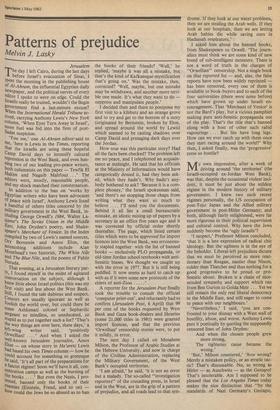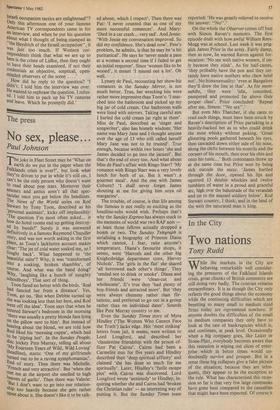Patterns of prejudice
Melvin J. Lasky The day I left Cairo, during the last days before Israel's evacuation of Sinai, I spent the morning in the publishing house of Al-A hram, the influential Egyptian daily newspaper, and the political nerves of every editor I spoke to were on edge. Could the Israelis really be trusted, wouldn't the Begin government find a last-minute excuse? When the International Herald Tribune ar- rived, carrying Anthony Lewis's New York Column, 'When Eyes Turn Away in Israel', More fuel was fed into the fires of post- Sadat suspicion. 'You see,' one Al-Ahram editor said to me, 'here is Lewis in the Times, reporting that the Israelis are using these hopeful Camp David days to intensify cultural repression in the West Bank, and even ban- ning two of our leading pro-peace writers, both columnists on this paper — Tewfik El Hakim and Naguib Mahfouz ...' The editors were, mostly, reasonable people, and my shock matched their consternation.
In addition to the ban on 'works by Egyptian writers who have been advocates of peace with Israel', Anthony Lewis listed a handful of others titles censored by the military government in the West Bank, in- cluding George Orwell's 1984, Walter La- queues The Soviet Union in the Middle East, John Dryden's poetry, and Shake- speare's Merchant of Venice. In the Index compiled by two of Lewis's named sources, 013' Bernstein and Amos Elon, the astonishing additions include Alan Moorhead's two histories, The White Nile and The Blue Nile, and the poems of Pablo Nerucla.
That evening, at a Jerusalem literary par- ty, I found myself in the midst of agitated conversation on the subject, although I knew little about Israel politics (this was my first visit) and less about the West Bank. Still, I found the tale dubious and suspect. Censors are usually ignorant as well as foolish the world over, but could there be some Ashkenazi colonel or Sephardic sergeant so mindless, so uneducated, so stupid as to put together such a list? 'That's the way things are over here, these days,' a left-wing writer said, 'positively Orwellian! ....' And when I asked the well-known Jerusalem journalist, Amos Elora — on whose story in Ha'aretz Lewis had based his own Times column — how he could account for something so grotesque he said, 'It's all part of the preparations for a fascist regime! Soon we'll have it all, con- centration camps as well as the burning of the books ....' But even the Nazis, I pro- tested, banned only the books of their enemies (Einstein, Freud, and so on) how could the Jews be so absurd as to ban the books of their friends? 'Well,' he replied, 'maybe it was all a mistake, but that's the kind of Kafkaesque mystification that's going on.' Was the mistake, then, corrected? 'Well, maybe, but one mistake may be withdrawn, and another more terri- ble one made. It's what they want to do suppress and manipulate people.'
I decided then and there to postpone my first visit to a kibbutz and an orange grove and to try and get to the bottom of a story (originated by Bernstein, broken by Elon, and spread around the world by Lewis) which seemed to be casting shadows over Camp David and presaging dark days over the Jordan.
How true was this particular story? Had all the facts been checked? The problem left me no peace, and I telephoned an acquain- tance at midnight. He said that his officials at the Ministry of Information would have categorically denied it, had they been ask- ed, which they hadn't. Why hadn't any- body bothered to ask? 'Because it is a com- plete phoney,' the Israeli spokesman said, 'and there's no stopping those chaps from writing what they want so much to believe .... I'll send you the documents. Behind it all lies a small bureaucratic mistake, ala idiotic mixing up of papers by a secretary in an office five years ago and it was corrected by official order shortly thereafter. The page, which listed certain titles which were to be approved for import licences into the West Bank, was erroneous- ly stapled together with the list of banned books — exclusively PLO propaganda, or old-time Jordan school textbooks with anti- Semitic biases. We thought we caught up with the error in 1977. But it is still being peddled. It now seems as hard to catch up with as if it were some new protocols of the elders of anti-Zion A reporter for the Jerusalem Post finally took the trouble to consult the official 'computer print-out', and reluctantly had to confirm (Jerusalem Post, 6 April) that 99 per cent of the books requested by West Bank and Gaza book-dealers and libraries (some 21,000 titles in 1981) were granted import licences, and that the previous 'Orwellian' censorship stories were, to put it mildly, in error.
The next day I called on Menahem Milson, the Professor of Arabic Studies at the Hebrew University, and now in charge of the Civilian Administration, replacing the Military Government, of the West Bank's occupied territories.
'I am afraid,' he said, 'it is not an error but a malady. The so-called "investigation reporters" of the crusading press, in Israel and in the West, are in the grip of a pattern of prejudice, and all roads lead to that syn- drome. If they look at our water problems, then we are stealing the Arab wells. If they look at our hospitals, then we are letting Arab babies die while saving ours in Hadassah respirators.'
I asked him about the banned books, from Shakespeare to Orwell. 'The journ- alists must think we are some kind of new breed of sub-intelligent monsters. There is not a word of truth in the charges of "Orwellian" censorship. Not a single book on that reported list — and, alas, the false reports have now been widely reprinted has been censored, every one of them is available to book-buyers and to each of the four universities (there were none before) which have grown up under Israeli en- couragement. That 'Merchant of Venice' is not the Bard's play, but a vicious pamphlet making pure anti-Semitic propaganda out of the play. That's the title that's banned along with a host of other such rabid vapourings .... But lies have long legs. How can we ever catch up with them once they start racing around the world?' Why then, I asked finally, was the 'progressive' press so hostile?
My own impression, after a week of driving around 'the territories' (the Israeli-occupied ex-Jordan West Bank), was that, despite the occasional violent inci- dent, it must be just about the mildest regime in the modern history of military government. I knew two such recent regimes personally, the US occupation of post-Tojo Japan and the Allied military government in post-Hitler Germany; and both, although fairly enlightened, were far more rigorous in their political supervision and cultural control. Why have the Jews suddenly become the 'ugly Israelis'?
'I suspect,' Professor Milson concluded, 'that it is a late expression of radical chic ideology. But the ugliness is in the eye of the beholder. Liberal-left prejudices dictate that we must be perceived as more reac- tionary than Reagan, nastier than Nixon, colder than Thatcher and thus nothing for a good progressive to be proud or pro- Semitic about. Broken is a chain of nice- minded sympathy and support which ran from Ben Gurion to Golda Meir . . . Yet we still remain the only real liberal democracy in the Middle East, and still eager to come to peace with our neighbours.'
'Nevertheless,' I said, 'you are con- fronted to your dismay with a West wall of hostility, abuse, and worse. Anthony Lewis puts it poetically by quoting the supposedly censored lines of John Dryden: And when the chosen people grew more strong, The righteous cause became the wrong.'
But,' Milson countered,' how wrong? Merely a mistaken policy, or an erratic tac- tic? That's discussable. No, as wrong as Hitler — as Auschwitz — as the Gestapo! That's intolerable. Am I supposed to be pleased that the Los Angeles Times today makes the nice distinction that "by the standards of Nazi Germany's Gestapo, Israeli occupation tactics are enlightened"? Only this afternoon one of your famous American TV correspondents came in for an Interview, and when he put his question about what I thought of being stamped as "the Heydrich of the Israeli occupation", it was just too much. If Western cor- respondents think that what we are up to here is the crime of Lidice, then they ought to have their heads examined, if not their credentials as objective, sceptical, open- Minded observers of the scene ' How did he reply to the question? 'I didn't. I told him the interview was over. He wanted to rephrase the question. I refus- ed. I told him to pack up his TV cameras and leave. Which he promptly did.'







































 Previous page
Previous page